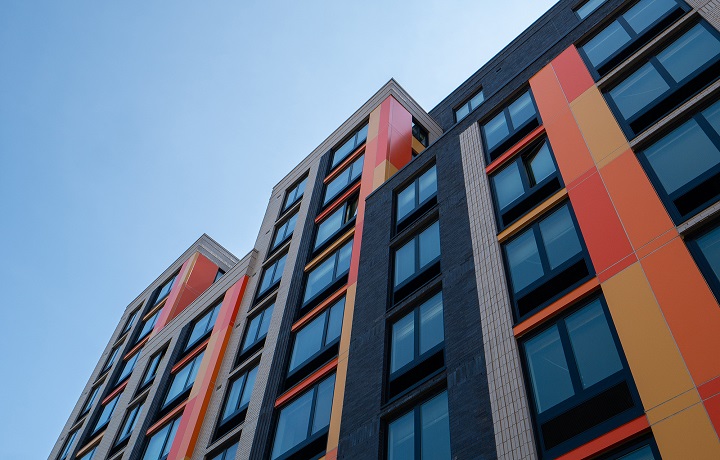
The recently opened Kingsbridge Heights Apartments, a $70.5 million affordable housing development along the Jerome Avenue corridor in the Kingsbridge Heights neighborhood of the Bronx.
As New York City continues its ambitious initiative to build thousands of new affordable housing units, a loophole in our laws means the city’s plan is on track to simultaneously create thousands of low-wage jobs that leave New Yorkers in poverty.
It hasn’t always been this way. Affordable housing has historically provided good jobs for working New Yorkers. But, now it’s normal to see staff in these buildings struggling to get by, relying on public assistance like Medicaid, facing eviction because of the high cost of rent or even living in homeless shelters. It’s time to fix this unnecessary contradiction.
That’s why 32BJ and our 85,000 New York members are calling on the City Council to pass and the Mayor to sign a bill which would require family-sustaining wages and benefits for workers in city-financed affordable housing developments. Co-sponsored by 36 members of the City Council, this bill (Intro 1321 sponsored by Espinal) would ensure the Housing New York Plan addresses both sides of the affordable housing crisis: limited affordable housing stock and poverty-wage jobs that create the need for affordable housing in the first place.
The Housing New York Plan will build 120,000 new affordable housing units that will generate more than 1,800 new jobs for porters, maintenance workers, superintendents and other building service workers. These building service jobs could provide life-changing opportunities for residents of low-income communities if they come with good wages and benefits.
The good news is that New York City already has recognized standards for building service jobs—prevailing wage, set annually by the Comptroller, that includes hourly wages, health and retirement benefits—that Housing New York can work from. The bad news is that, while current city law requires projects that receive taxpayer subsidies to pay these family-sustaining wages and benefits, housing developments that are majority affordable are excluded. This means wages in city-financed affordable housing developments are typically set at around $40,000 a year without health or retirement benefits, instead of matching industry standards. This annual income, which is a ceiling, not a floor, puts most families under the median income for a family of four to live in New York City, and can makes them eligible for subsidized health insurance, food assistance, and low-income housing itself.
To ensure that our communities truly benefit when the city is subsidizing new affordable housing developments, we need to pass prevailing wage legislation for these projects.
The prevailing wage is a marginal cost relative to the total price-tag of development. It would be a direct investment in the neighborhoods where affordable housing is built and where workers typically live, and should be a cornerstone of a holistic plan to keep New York City inclusive for working families.
Get the best of City Limits news in your inbox.
Select any of our free weekly newsletters and stay informed on the latest policy-focused, independent news.
32BJ has already helped workers win good wages and benefits in some of the new affordable projects that the city is financing. Our union also already represents more than 3,000 workers in income-restricted housing citywide who serve as a model for how to implement the proposed prevailing wage. We know from these experiences that it is feasible to create affordable housing with jobs that support workers and their communities.
The City Council, which has shown strong leadership for vulnerable New Yorkers, should finally insist that our taxpayer dollars fund good jobs for local community members while building the affordable housing they need. Thousands of working families’ livelihoods are on the line. 32BJ SEIU plans to be there every step of the way in this fight for good jobs and strong communities.
Kyle Bragg is the secretary-treasurer of 32BJ SEIU, the largest property service union in the country.









One thought on “Opinion: Affordable-Housing Workers Deserve Fairness, Too”
How does this get paid for? Affordable housing buildings are funded by a mortgage, tax credits, and capital subsidies. If operating costs go up (ie, paying workers nearly double, which is what this bill would do), that means the building can support less mortgage. The tax credit amount does not change. Since there is no economic incentive for developers to fill this gap (that will effectively talk all of their profits away), the only option is for the City to subsidize this. It strikes me as irresponsible for the City to pass legislation mandating something, without a plan for how it gets funded. And the net result would be that fewer affordable housing units get developed, resulting in less affordable housing and fewer of such jobs that this legislation seeks to create. To be clear, I fully support all people being paid a living wage for their work – it’s good for society and for the economy. But, these bills must be legislated responsibly or else they will have the reverse effect.